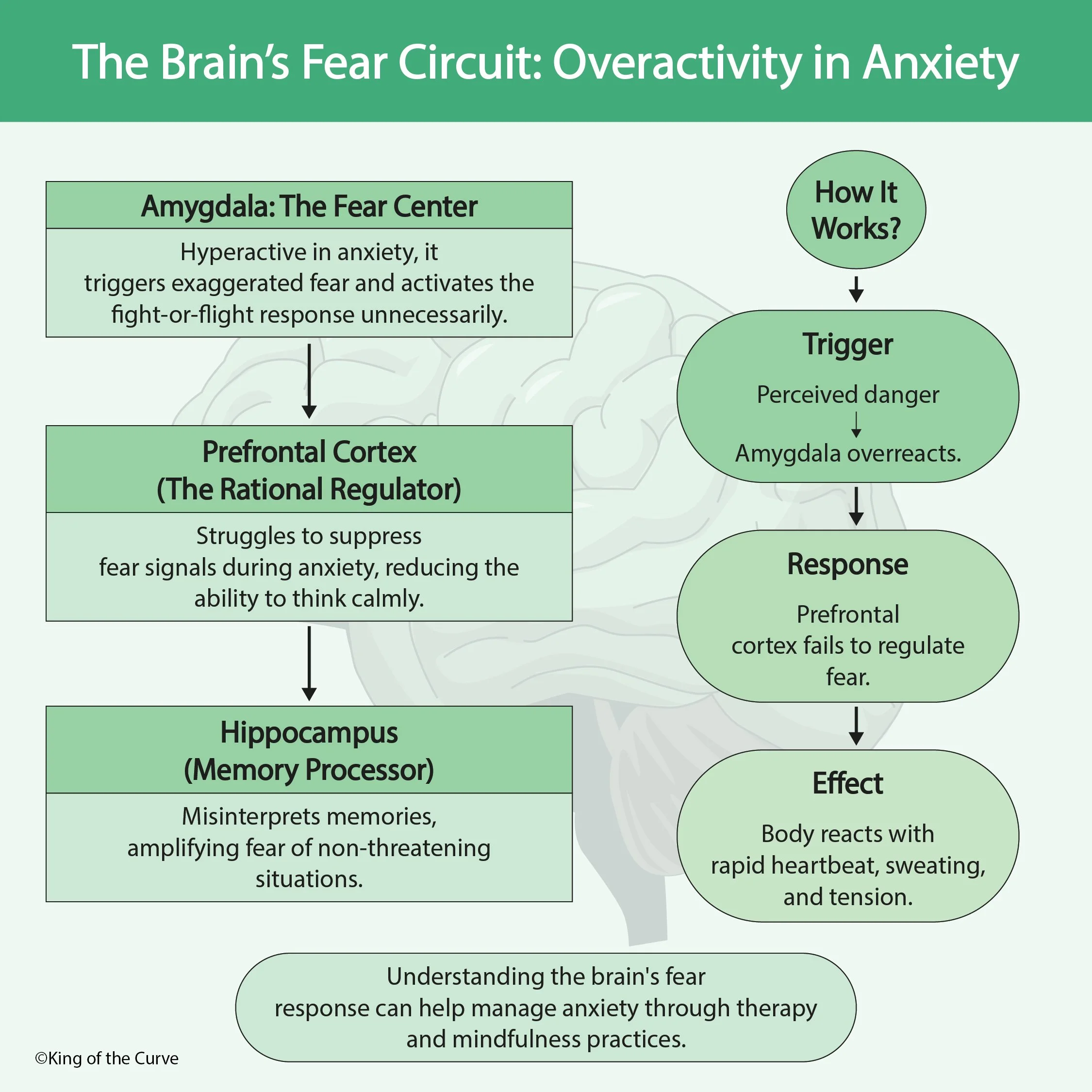Understanding the Brain’s Fear Circuit in Anxiety: A Must-Know for MCAT Success
Anxiety disorders are among the most prevalent mental health conditions, affecting millions worldwide. Understanding the brain’s fear circuit is essential for recognizing the biological basis of anxiety and finding effective ways to manage it. This blog explores how overactivity in specific brain regions contributes to anxiety and how this concept is relevant for medical exams like the MCAT.
How the Brain’s Fear Circuit Works
The brain’s fear response is designed to protect us from danger. However, in anxiety disorders, this system becomes overactive, leading to excessive fear and stress responses even in non-threatening situations. Three key brain structures play a role in this dysfunction:
1. Amygdala: The Fear Center
The amygdala is responsible for detecting threats and triggering the fight-or-flight response. In individuals with anxiety, the amygdala is hyperactive, overreacting to perceived dangers and unnecessarily activating the body’s stress response.
2. Prefrontal Cortex: The Rational Regulator
The prefrontal cortex helps regulate emotions and suppresses inappropriate fear responses. In anxiety, this region struggles to control the signals from the amygdala, making it harder to think rationally and manage fear effectively.
3. Hippocampus: The Memory Processor
The hippocampus is involved in memory formation and distinguishing between real and perceived threats. In anxiety, it may misinterpret past experiences, reinforcing fear responses to harmless situations.
The Anxiety Response: A Step-by-Step Breakdown
Trigger: A perceived threat (real or imagined) activates the amygdala.
Response: The prefrontal cortex fails to regulate the fear signal.
Effect: The body experiences physical symptoms of anxiety, such as rapid heartbeat, sweating, and muscle tension.
This cycle perpetuates anxiety, making it difficult to break free from constant fear and worry.
MCAT Connection: Neurobiology of Anxiety
For MCAT test-takers, understanding the neurobiology of anxiety is crucial. Questions on the exam may test:
The role of the amygdala in emotional processing.
The prefrontal cortex’s function in cognitive regulation.
The hippocampus’s role in memory and learning.
The physiological effects of the autonomic nervous system in stress responses.
A strong grasp of these concepts will help you tackle MCAT questions related to the nervous system and behavioral sciences.
Managing Anxiety: Evidence-Based Strategies
Understanding the fear circuit allows for targeted interventions, including:
Cognitive-Behavioral Therapy (CBT): Strengthens prefrontal cortex control over fear responses.
Mindfulness and Meditation: Helps rewire brain pathways to reduce amygdala hyperactivity.
Medication: Selective serotonin reuptake inhibitors (SSRIs) help balance neurotransmitters to regulate fear processing.
Expand Your Knowledge with KOTC
At King of the Curve, we’re passionate about long-term learning, making results effortless and rewarding for over 100,000 downloads of our resources. Our unique features—like the Adaptive Q-Bank, stunning visuals, multiplayer modes, timed practice, and daily questions—help you master science concepts, including mental health, for exams like the MCAT. Check out our KOTC classroom, earn Curve Coins through gamification, and explore our custom homepage at mcat.kingofthecurve.org for more resources.
For a more comprehensive understanding, visit mcat.kingofthecurve.org. Access over 1000+ illustrations summarizing core concepts essential for MCAT success.
Frequently Asked Questions (FAQs)
-
Aim for 4-6 focused hours, ensuring you incorporate breaks to avoid burnout.
-
Practice mindfulness techniques, take practice exams under realistic conditions, and maintain a balanced lifestyle.
-
Set short-term goals, seek support from mentors, and reward yourself for small achievements.
-
Regular exercise improves focus, reduces stress, and enhances overall mental clarity.
-
KOTC offers personalized learning tools, gamification features, and adaptive question banks to help students stay on track without burnout.


